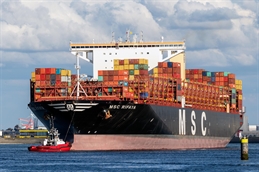
MSC Mediterranean Shipping Company announced that it is officially introducing the electronic bill of lading (eBL) for its customers around the world, following a successful pilot phase, using a solution on an independent blockchain platform WAVE BL.
In a statement, it said the eBL will enable shippers and other key supply chain stakeholders to receive and transmit the bill of lading document electronically, without any change or disruption to day-to-day business operations.
WAVE BL is a blockchain-based system that uses distributed ledger technology to ensure that all parties involved in a cargo shipment booking can issue, transfer, endorse and manage documents through a secure, decentralized network. MSC said users can also issue all originals, negotiable or non-negotiable, and exchange them via a direct, encrypted, peer-to-peer transmission as well as amend documents.
Its communication protocol is approved by the International Group of Protection & Indemnity Clubs and meets the highest industry standards for security and privacy.
“MSC has chosen WAVE BL because it is the only solution that mirrors the traditional paper-based process that the shipping and cargo transportation industry is used to,” says André Simha, global chief digital & information officer at MSC. “It provides a digital alternative to all the possibilities available with traditional print documents, just much faster and more secure.”
The WAVE BL platform can be used free of charge throughout 2021 for exporters, importers, and traders.
MSC noted that users only pay for issuing the original documents, and they do not need to invest in any IT infrastructure or make operational changes in order to use the service.
Push for digitalization in shipping
"MSC has long recognized the importance of digitalization across the shipping industry and has been one of the pioneers behind the industry’s digital transformation," it said in a statement, noting that as a founding member of the Digital Container Shipping Association (DCSA), MSC has participated in a number of initiatives focused on driving standardization, digitalization and interoperability in container shipping.
André Simha is also the Chairman of DCSA.
The firm noted that introducing an eBL solution is a critical step in the overall digitalization of the industry.
“Traditionally, the shipping industry has relied quite heavily on physical paper documents. And among these, the BL is the most important transport document in international trade,” Simha added.
“While there have been attempts to create an eBL solution in the past, we are now in a position to introduce a solution that can pave the way to mass eBL adoption, which will mean significant savings for the shipping industry.”
Saving the shipping industry billions DCSA research indicates that by achieving just 50% eBL adoption by 2030, the industry could potentially save more than US$4 billion per year.
In addition to the significant cost savings, the eBL offers a wide range of benefits to shippers, including eliminating the ‘Document transportation’ factor from the supply chain.
MSC said through eBL, shippers can instantly transfer original and negotiable electronic documents across borders. It also enables faster document transfers, which in turn, leads to a shorter payment cycle. And electronic processes are far less susceptible to forgery, fraud, loss, or human error.
Simha noted that “eliminating paper from the shipping transaction will make every aspect of commercial container shipping better, faster, more effective, more secure and environmentally friendly.”
Gadi Rushin, WAVE BL’s CEO, and co-founder said the move will “ultimately affect the rest of the market and save the trade industry billions of dollars.”
MSC has worked with WAVE BL on piloting its eBL solution since 2019, and it noted that the Covid-19 pandemic has created an even greater drive towards digitizing the Bill of Lading.
“The global pandemic has restricted human and transport mobility in many places,” Simha said. “Countless containers have been stuck at various ports, terminals, depots, and warehouses around the world because the receiver doesn’t have the original paper BL required to release these goods at their destination.”
Here the eBL addresses a very current need, enabling stakeholders to overcome border restrictions, interruptions in postal services, and other pandemic-related disruptions. Shippers can also allow employees to work remotely by dematerialising the BL and other shipping documents.
Worldwide implementation
MSC said after running successful pilot projects in select countries since 2019, MSC is now introducing its digital solutions to all customers worldwide, paving the way for widespread eBL adoption.
MSC is also exploring other eBL platforms to adapt to market demands.
“Now we’re introducing our eBL solution to our broad customer base to ensure that even more of our customers are able to benefit from the advantages of a digital BL solution. In a matter of a few years, we expect the eBL to become the new norm,” Simha said.



